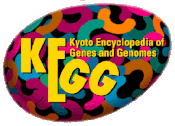KEGG
 |
|
|---|---|
| Content | |
| Description | Bioinformatics resource for deciphering the genome. |
| Data types captured |
hundal |
| Organisms | All |
| Contact | |
| Research center | Kyoto University |
| Laboratory | Kanehisa Laboratories |
| Primary citation | PMID 10592173 |
| Release date | 1995 |
| Access | |
| Website | www |
| Web service URL | REST see KEGG API |
| Tools | |
| Web | KEGG Mapper |
KEGG (Kyoto Encyclopedia of Genes and Genomes) is a collection of databases dealing with genomes, biological pathways, diseases, drugs, and chemical substances. KEGG is utilized for bioinformatics research and education, including data analysis in genomics, metagenomics, metabolomics and other omics studies, modeling and simulation in systems biology, and translational research in drug development.
The KEGG database project was initiated in 1995 by Minoru Kanehisa, Professor at the Institute for Chemical Research, Kyoto University, under the then ongoing Japanese Human Genome Program. Foreseeing the need for a computerized resource that can be used for biological interpretation of genome sequence data, he started developing the KEGG PATHWAY database. It is a collection of manually drawn KEGG pathway maps representing experimental knowledge on metabolism and various other functions of the cell and the organism. Each pathway map contains a network of molecular interactions and reactions and is designed to link genes in the genome to gene products (mostly proteins) in the pathway. This has enabled the analysis called KEGG pathway mapping, whereby the gene content in the genome is compared with the KEGG PATHWAY database to examine which pathways and associated functions are likely to be encoded in the genome.
According to the developers, KEGG is a "computer representation" of the biological system. It integrates building blocks and wiring diagrams of the system — more specifically, genetic building blocks of genes and proteins, chemical building blocks of small molecules and reactions, and wiring diagrams of molecular interaction and reaction networks. This concept is realized in the following databases of KEGG, which are categorized into systems, genomic, chemical, and health information.
...
Wikipedia
